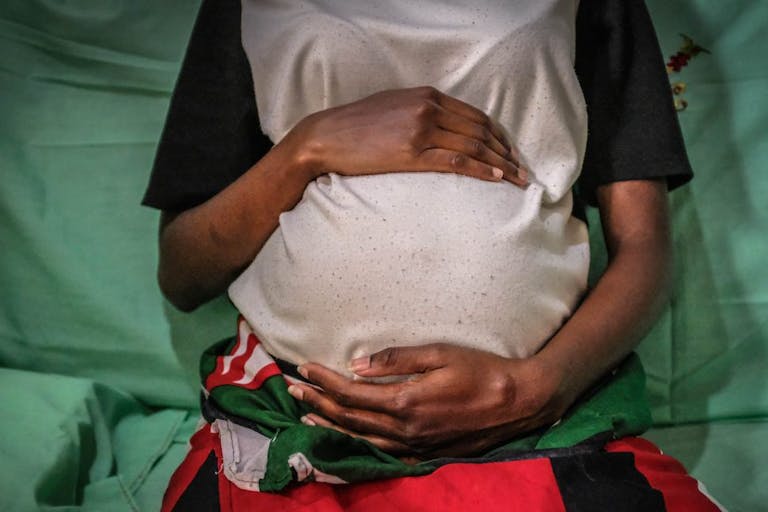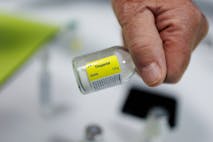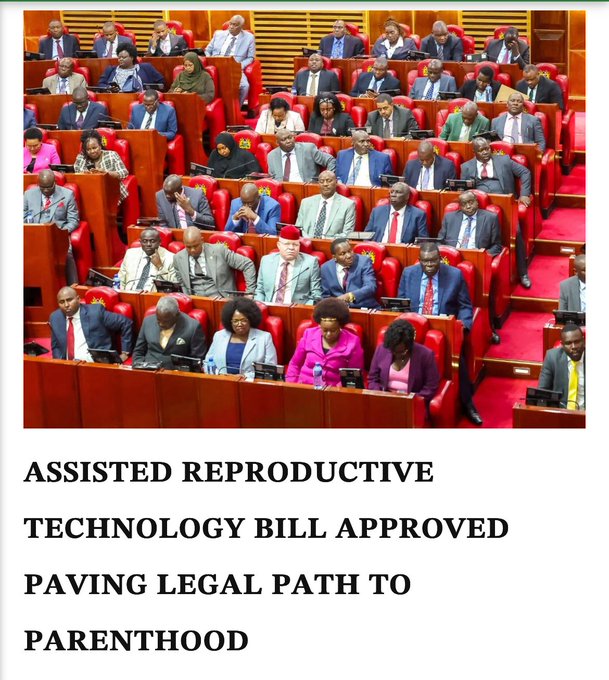The National Assembly on Tuesday, November 1, 2025 approved, with amendments, the Assisted Reproductive Technology (ART) Bill, 2022. The Bill seeks to create a legal framework for surrogacy and other ART services in Kenya, marking an important milestone in strengthening

Kenya’s National Assembly passes bill outlawing commercial surrogacy
Kenya’s National Assembly passes bill outlawing commercial surrogacy
Kenya’s National Assembly has passed the Assisted Reproductive Technology (ART) Bill 2022, setting up a legal framework to govern fertility treatments and surrogacy in the country. The bill will outlaw commercial surrogacy and unethical practices such as human cloning and sex selection, but most are hailing it as a victory for "reproductive rights."
Key Takeaways:
Under the new bill, unpaid (altruistic) surrogacy is permitted, while commercial surrogacy is forbidden.
Those who violate the law could face up to 10 years in prison.
Surrogacy, regardless of whether it is done for money, is inherently exploitative and commodifies women and children.
The Details:
Per the new bill, Kenya will only allow non-commercial (unpaid) surrogacy, with the bill explicitly forbidding commercial surrogacy and permitting only altruistic surrogacy for Kenyan citizens who are divorced, widowed, or single. An ART specialist must first certify those citizens as unable to conceive children naturally.
The new bill will pave the way for the creation of an Assisted Reproductive Technology Committee under the Kenya Medical Practitioners and Dentists Council (KMPDC) to license clinics and experts, regulate practice, and keep a confidential national register of donors, embryos, and children conceived through assisted methods. The Reproductive Health Network Kenya, which portrays the bill as "rights-based," noted on X:
By establishing a clear legal framework for ART and surrogacy, the Bill helps protect the rights of individuals and families seeking these services, reduces exploitation and ambiguity, and promotes access to regulated, high-quality reproductive health options. It also signals growing national recognition of diverse fertility needs and the importance of ensuring that every person has the right to make informed choices about their reproductive journey.
But do these choices uphold the rights that children have to their biological mothers and fathers?
Under the new law, individuals involved in commercial surrogacy will be penalized with a fine of up to 10 million Kenyan shillings [over $77,000 USD] or jail for up to a decade.
Those who breach the law by participating in commercial (paid) surrogacy, or getting involved in practices such as human cloning, the sale of gametes (sperm and ova) or of embryos, along with sex selection, will also be penalized.
Only Kenyans aged between 25–55 years are allowed to pursue altruistic surrogacy. Surrogate mothers are required to be aged between 25 and 45 years old, and must also undergo and pass medical and psychological assessments before they can qualify as surrogates.
To deter commercial surrogacy, the law will mandate that everyone seeking surrogacy offer written consent. It will also prohibit the use of reproductive material after a person’s death if past approval has not been granted.
Concurrently, the legislation allows gamete donations (reproductive cell donations — sperm and ova) to 10 per person. Counseling for both intended parents and surrogate mothers would be compulsory to ensure that all parties involved comprehend the entire surrogacy process.
Why It Matters:
The fertility industry is rife with widespread abuses, including surrogacy, for which even a senior United Nations official has called to end. Surrogate mothers often live in poverty, choosing to become surrogates for wealthy buyers so they can better their families.
Surrogate mothers are also at a higher risk for numerous complications, including gestational diabetes, hypertension related to pregnancy, and post-birth bleeding complications.
The children born from surrogacy are also at risk, as IVF in and of itself is associated with higher risks for children, including low birth weight and prematurity. Separating babies from their birth mothers, biologically related or not, is also known to cause trauma, and can even be known to permanently alter adult brain function.

The Bottom Line:
Surrogacy in all its forms is inherently exploitative and harms women and children alike.
Live Action News is pro-life news and commentary from a pro-life perspective.
Contact editor@liveaction.org for questions, corrections, or if you are seeking permission to reprint any Live Action News content.
Guest Articles: To submit a guest article to Live Action News, email editor@liveaction.org with an attached Word document of 800-1000 words. Please also attach any photos relevant to your submission if applicable. If your submission is accepted for publication, you will be notified within three weeks. Guest articles are not compensated (see our Open License Agreement). Thank you for your interest in Live Action News!
Dear Reader,
Have you ever wanted to share the miracle of human development with little ones? Live Action is proud to present the "Baby Olivia" board book, which presents the content of Live Action's "Baby Olivia" fetal development video in a fun, new format. It's perfect for helping little minds understand the complex and beautiful process of human development in the womb.
Receive our brand new Baby Olivia board book when you give a one-time gift of $30 or more (or begin a new monthly gift of $15 or more) to fuel Live Action’s life-saving content.
Read Next

Famous twin entertainers choose to die together in assisted suicide
Cassy Cooke
·More In Issues

Issues
Famous twin entertainers choose to die together in assisted suicide
Cassy Cooke
·
Issues
Individuals with autism and intellectual disabilities euthanized over loneliness
Nancy Flanders
·
Issues
British neurosurgeon laughs at past remarks about 'grannies... bullied into' suicide
Bridget Sielicki
·
Issues
Philadelphia City Council declares killing preborn babies a 'human right,' slams pregnancy centers
Bridget Sielicki
·
Issues
Arkansas man accused of raping child, brutally beating her to kill her preborn baby
Cassy Cooke
·More From Angeline Tan

International
Belgium’s mandatory, taxpayer-funded health insurance to cover euthanasia costs
Angeline Tan
·
Investigative
Pro-life group exposes late-term abortion industry in Canada
Angeline Tan
·
Issues
Agency warns Poland’s population may fall further than forecast
Angeline Tan
·
International
Tokyo enacts four-day workweek to help end Japan's demographic crisis
Angeline Tan
·
Human Rights
Analyzing AquaWomb: Can artificial wombs ever truly be pro-life?
Angeline Tan
·